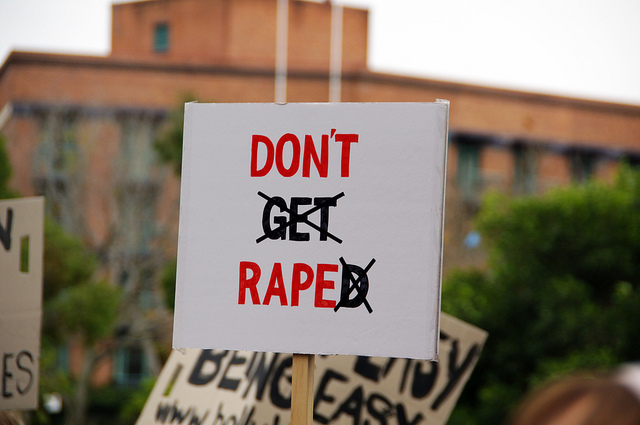If it seems women like me don’t have a lot of patience for listening to how men think, feel and talk about rape it’s because, well…. it’s true.
Listening to men talk about rape is about as enlightening as listening to men talk about menstrual cramps, labor pains and hot flashes. It’s not because we’re not kind or patient or open-hearted. It’s not because we don’t realize some of men’s best friends are women.
It’s because, as the Boston Area Rape Crisis website says:
“Rape is not miscommunication. It is a crime.”
Women are usually the victims of this crime. Men are usually the perpetrators of this crime. 99 percent of the time, it is women who are victims/survivors of rape. 85 percent to 99 percent of the time men commit the crime of rape.
Some issues are gendered. Rape is one of them. And so, in large part, are our reactions. To some, rape is a conversation. To some, it’s a crime. Where and how we fall shapes our perspectives.
And while I’m a woman and speak for many women, I don’t, of course, speak for all women.
So for myself, I say, that how men feel in or about conversations about rape is not high on my priority list. I don’t even think it’s close to important when addressing the reality of rape.
Women are disproportionately injured by this act of violence—and almost always—by men. One percent of the time, it is men who are victimized by rape. That is 100 percent horrible. Rape is always a crime.
The vast majority of rapists are male. The vast majority of humans who are raped are female.
This is why, I believe, the gender divide is so vast when it comes to the ways men and women think, feel and experience the violence of rape.
I think it’s why, when comedian Sarah Silverman re-Tweeted Ten Rape Prevention Tips a few months back it went viral. It was satire but it hit a nerve. However, it wasn’t the same nerve that got hit by everyone. Many women loved it. Many men were offended by it. Many women saw it as putting responsibility entirely on men not to rape women, rather than women being advised how not to get raped.
Men wrote on Twitter that they felt it implied she was saying all men are potential rapists.
All men are not potential rapists. Men are disproportionately the gender that rapes. Gender matters. Race is significant as well.
According to the Rape and Incest National Network, the percentage of women raped (or attempted to be raped) varies some to make up the one in six women statistic many of us have heard:
>>> 34.1 percent of all American Indian/Alaskan women have been raped (or attempted to be raped)
>>> 24.4 percent of mixed race women have been raped (or attempted to be raped)
>>> 18.8 percent of Black women have been raped (or attempted to be raped)
>>> 17.7 percent of White women have been raped (or attempted to be raped)
>>> 6.8 percent Asian Pacific Islander women have been raped (or attempted to be raped)
Each statistic is staggering, alarming and terrifying.
It’s mind boggling to see the percentages of women who have survived rape or attempted rape.
When it comes to rape, we women don’t see ourselves as hosting the conversation party as is implied in the article by Waylon entitled: How (not to) Bring Men into the Conversation about Rape.
Many of us see ourselves as threatened, unsafe and with experiences of violence which are life-threatening and altering.
From the female perspective, women are not hosting a rape conversation. From the female perspective it can seem some men are having a SuperBowl rape event and women are too often forced to be the half time show.
I realize this makes me sound angry. Like a feminist.
I am angry. And a feminist.
My anger does impact my ability to be generous with and compassionate toward men who venture into the rape conversation.
Why?
Because I don’t want to waste precious life-force energy worrying about being raped or recovering from rape. I don’t want to live in fear that my daughter, sister, mothers and friends will be raped or raped again. I don’t want men to be raped either.
I’m tired of seeing loved ones shattered by this crime. I’m tired of rapists doing the shattering.
Most rapists are male. Most victimized by rape are female.
Half of women raped will suffer from post-traumatic stress disorder. Rates of depression, alcohol and drug abuse and suicide go up after rape.
This is why many of us don’t want to have conversations about rape. We just want men to stop raping women and other men. Not all men—the men who rape.
And yes, of course, for the women who rape to stop raping as well.
The elephant in the conversation:
I am a writer for elephant journal and a feminist and activist. This is in part my response to the founder’s writing on this topic which I have tried to sit with and let go of repeatedly. It is why I get crabby and intolerant and can’t listen with patience and smile when even nice men talk about rape.
Honestly, sometimes I have to dig really deep to keep from a full-on screaming rage when even trying to listen. Sometimes that’s the nicest and kindest and most peaceful thing I can do. And it requires great effort.
Sometimes I might even be biting my tongues or rolling my eyes. I know this isn’t me at my spiritual best.
Sometimes it feels like men act as though women need invite them to the rape conversation and if we’re not nicer they’ll just not come anymore. Sometimes I resent feeling women are responsible for the tone of the rape conversation.
Women are not waving cheerleader banners for good effort or giving thumbs up likes to men “brave” enough to think out loud about rape.
There’s a reason.
We are busy.
We’re in martial arts, or self-defense or reaching for pepper spray or going to a yoga class for sexual assault survivors. We’re turning down jobs where we don’t feel safe traveling and doing therapy for post-traumatic stress.
We’re not triggered or oversensitive or failing to appreciate gentle-souled men.
We’re sick of being raped, recovering from rape, worrying about being raped, supporting others who have been raped, preventing rape and writing articles to trying to educate others about rape.
I know elephant journal isn’t exactly known as a feminist press. I don’t agree with everyone here and have strong reactions even to Waylon’s writing and his video touching on the topic. But I love elephant journal because this can happen. I respect Waylon’s vision. I respect the other writers and editors at elephant journal.
When Waylon says he invites discourse even on this topic, I believe it’s the truth. That’s why I’m here. I know writers at elephant journal are given tremendous freedom and that’s because of the culture he’s created and he and others maintain (I mean I can write this without losing a writing gig—I think).
He respects writers. He’s a writer. I’m a writer. Writers often think in writing.
“Rape is not miscommunication. It is a crime.”
And part of the reason is: rape isn’t a conversation. It’s a one-sided monologue almost always initiated by a man.
I’m attempting to communicate about why it’s hard to communicate. Even though it is hard to do—because maybe the stats on rape won’t change until the conversation does, too.
~
Sources:
Relephant:
Enough is Enough: Zero Tolerance for Rape Culture on Facebook.
Author: Cissy White
Editor: Catherine Monkman
Photo: Richard Potts/Flickr











Read 78 comments and reply